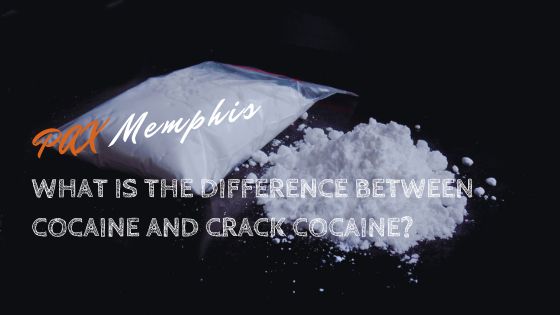When it comes to illicit drugs, few substances have garnered as much notoriety as cocaine and crack cocaine. Abusing cocaine or crack cocaine can damage your health, emotional well-being, relationships, and more. But what is the difference between cocaine and crack cocaine? And which one is more dangerous?
If you or a loved one are struggling with cocaine or crack cocaine addiction, please contact the PAX Memphis team to explore our addiction treatment programs or find support anytime in your recovery.
What is Cocaine?
Cocaine is a potent illicit stimulant drug. It is a highly addictive substance created from the dried leaves of the South American coca plant. Cocaine is often found in powder form, which users snort. It may also be formed into a solid that users can smoke.
What is Crack Cocaine?
Crack cocaine is the term that describes the solid form of cocaine. Crack cocaine looks like small whitish crystals. Users heat the crystals and inhale the vapor. Typically, smoking crack cocaine produces faster effects, which include increased energy and euphoria. Crack cocaine gained popularity in the 1980s, prompting legislators to pass laws allowing harsher penalties for people using or selling it.
Despite harsher penalties and increased legal consequences, crack cocaine is still available and relatively common. Research from 2021 showed that nearly a million people over the age of 12 used crack during the previous year.
Crack vs. Crack Cocaine: Understanding the Differences
At the most basic level, crack and crack cocaine are simply two forms of the same substance. Cocaine is the powder form of the drug, and crack is the solid form. Crack is made by mixing certain chemicals that remove the cocaine’s hydrochloride, resulting in a hard crystal substance.
However, there are some important differences between crack and crack cocaine in how people use them and the dangers they pose to users.
Method of use
People typically snort cocaine in its powder form or rub it on their gums, which produces effects that last for 45 to 60 minutes. Some users dissolve the powder in water and inject it, leading to a more intense, short-lived high.
People typically ingest crack cocaine by smoking it. Smoking crack cocaine is also known as “freebasing.” Smoking crack cocaine provides a rapid wave of euphoria. Users may feel its effects in just seconds. When people smoke crack cocaine, the effects don’t last very long–only about 10 to 20 minutes.
Side effects
Crack and crack cocaine both cause feelings of alertness, pleasure, and euphoria. Both forms of the drug can cause unwanted side effects, including:
- Dilated pupils
- Nausea
- Elevated body temperature
- Increased blood pressure
- Irregular or quick heartbeat
- Tremors
- Restlessness
- Constricted blood vessels
Both forms of cocaine can also damage your liver, kidneys, and cardiovascular and neurological systems.
Smoking crack cocaine may cause other risks to your health, including lung damage, asthma, and other breathing problems.
Snorting cocaine can cause damage to your nasal cavity, nosebleeds, loss of sense of smell, and chronic runny nose.
Legal status
Although cocaine is most often used illegally, it is still technically legal for use in a carefully-controlled medical setting as an anesthetic. It is not commonly used because of its potential to be addictive.
Although crack and cocaine are two forms of the same drug, legislation passed in 1986 created harsher sentencing laws for offenses that involve crack. However, new laws passed in 2010 and 2018 reduced these penalties and eliminated mandatory minimum sentences for crack possession.
Using both forms of cocaine can cause significant short and long-term damage to your health and well-being. Regularly using crack or cocaine can cause you to develop tolerance, meaning you need to use more of the drug to get the desired effects. Over time, you may develop dependence, which means your body requires the drug to function normally.
Crack and cocaine addiction are severe, complex conditions that require thoughtful, comprehensive treatment and ongoing support.
Recognizing Addiction: Crack vs. Crack Cocaine
The first step in getting treatment to overcome drug addiction is being able to recognize that there is a problem. The signs of cocaine and crack addiction are often very similar. Here are some signs that you or a loved one may be living with cocaine addiction.
- Having to use more of the drug to get the effects you want
- Using the drug more often or in larger amounts than you intended to
- Wanting or attempting to stop using the drug but finding that you can’t
- Spending a lot of time, energy, and money getting, using, and recovering from the drug
- Having cravings for the drug
- Neglecting your responsibilities, hobbies, and relationships because of your drug use
- Continuing to use the drug, despite the risks or harm it causes
- Experiencing withdrawal symptoms if you stop using the drug
People with cocaine or crack addiction often experience severe withdrawal symptoms if they abruptly stop using it. It’s important to seek treatment as soon as you recognize the signs of addiction. With comprehensive treatment and ongoing support, you can identify and heal the condition’s emotional, physical, and behavioral roots and work toward a healthier future free of addiction.
Find Help Now
If you want to learn more about the similarities and differences between crack vs. crack cocaine, reach out to the PAX Memphis team today. Our caring admissions counselors will help you explore our cocaine addiction treatment programs, find the care you need to overcome addiction and work toward the healthier future you deserve. Don’t wait for the help you need. Call us today to start your recovery journey.
References:
Medically Reviewed: September 25, 2019

All of the information on this page has been reviewed and verified by a certified addiction professional.










